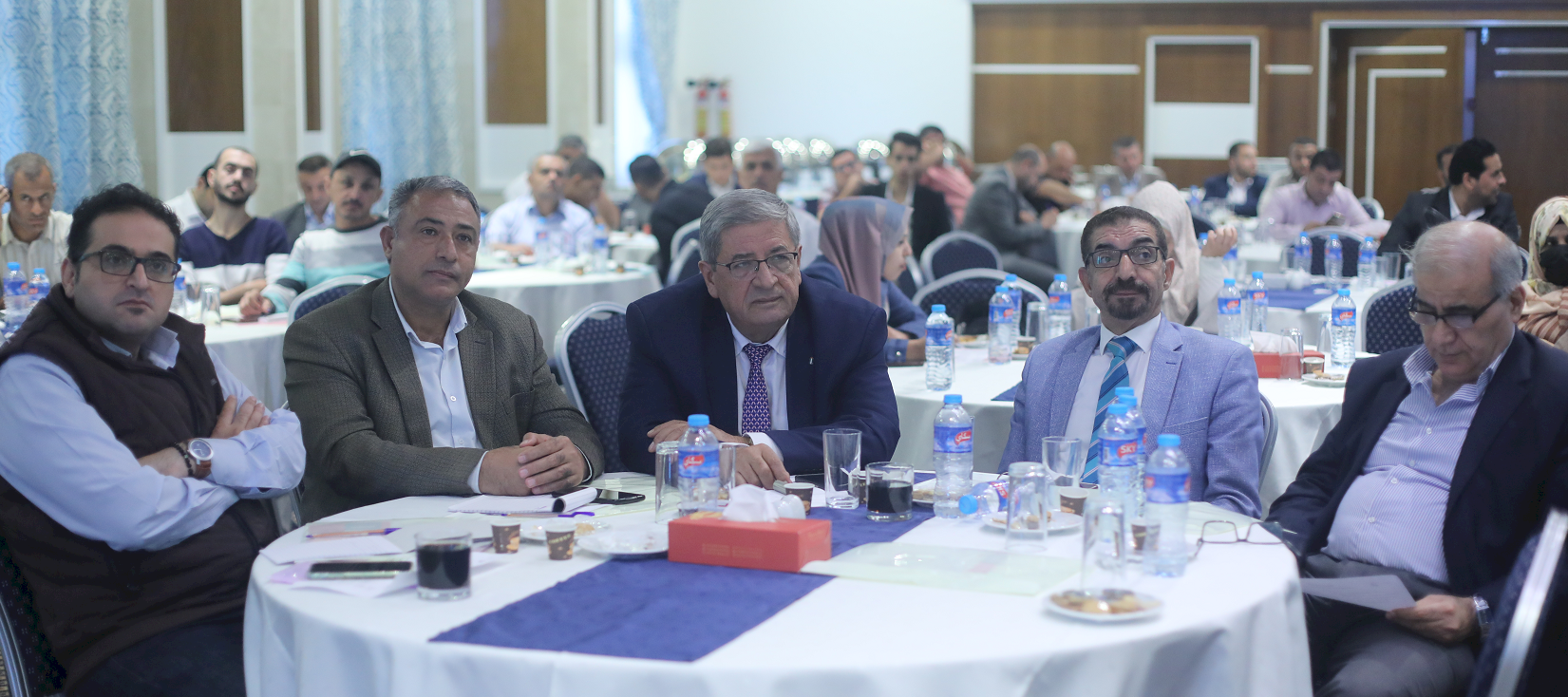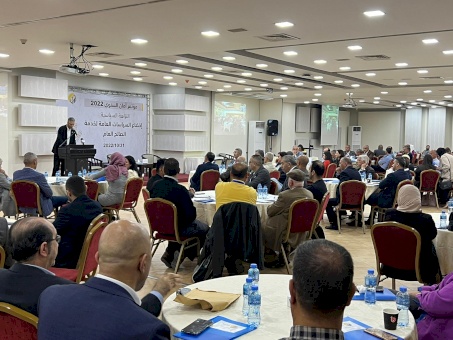
Under the heading Political Integrity: Putting Public Policies in the Service of Public Interest, AMAN holds its annual conference in the West Bank and Gaza
AMAN: The way out of the divide is to hold general elections and form a national unity government whose decisions and policies are subordinate to public, rather than partisan, interests
Ramallah and Gaza – The Coalition for Accountability and Integrity (AMAN) held its Annual Conference 2022, entitled Political Integrity: Putting Public Policies in the Service of Public Interest. The conference shed light on the current context of public policy making and implementation. The primary goal of public policies is supposed to serve the public interest while at the same reflecting the integrity of government. These should be designed to generate influential public opinion by civil institutions and give a voice to citizens in both the West Bank and the Gaza Strip. Public policies will aim at putting an end to the internal Palestinian political divide, promote integrity, fight political corruption, and set out a vision to eliminate pervasive corruption.
In his opening statement, Mr. Abed Al Qader Al Husseini, Chairman of AMAN’s Board of Directors, stressed the importance of more efforts to immunise the Palestinian government, including national institutions, against corruption in all of its diverse manifestations. This activity should bolster citizens’ trust and confidence in the governing authority. It will further contribute to re-establishing national unity and promoting the values of integrity and rule of the Basic Law, which governs the building of a democratic State grounded in the separation of powers, respect for the rule of law, and maintenance of public rights and freedoms, first and foremost human rights.
State institutions are controlled by powerful individuals within governing authorities in the West Bank and Gaza Strip
Al Husseini elaborated on the shift in the form of government in both the West Bank and the Gaza Strip. Political integrity has been progressively undermined due to the absent principle of separation of powers. The Executive has been in control of various centres of government. A participatory approach has also been lacking, further consolidating domination of the governing authority. The latter effectively exercises a monopoly on the approval of laws and regulations, which are made under a mantle of secrecy. Rather than ensuring social justice and serving the public interest, this body of legislation aims at strengthening the existence and domination of the governing authority. In the absence of the formal accountability system, namely the Palestinian Legislative Council (PLC), the Executive has been subject to no real oversight and accountability in the spheres of public administration and public financial management.
In relation to the monopoly and control of State institutions in the West Bank and Gaza Strip, Al Husseini emphasised that the power of individuals, rather than of elected State authorities, has been solidified by the decision to cancel legislative and presidential elections, enactment of a set of regulations, and blurring of the roles and operating mechanisms of the Palestinian Authority (PA) and Palestine Liberation Organisation. According to Al-Husseini, decision making has impacted appointments to higher positions and allowed room to some powerful individuals to abuse public office for their own personal interests under the guise of loyalty and support of legitimacy. It has also adversely affected aspects of democratic life and public freedoms, excluding the opposition and views at odds with the governing authorities in the West Bank and Gaza Strip.
Recurrent government reform plans lack a serious political will for implementation
In the first conference session, Mr. Jihad Harb, Senior Researcher at AMAN, made a presentation on “How a poor and fragile system of governance obstructs government reform policies”. Harb provided a review and assessment of failures to implement significant government reform policies over a period of 22 years. The reform strategy does not fulfil the requirement of a political will. Some centres of power do not have a genuine interest in the needed reform. Reform plans also lack a participatory approach as other segments of society are not engaged in priority setting. While a timeline for implementation is not in place, the process and goals of government reform are not laid out to citizens.
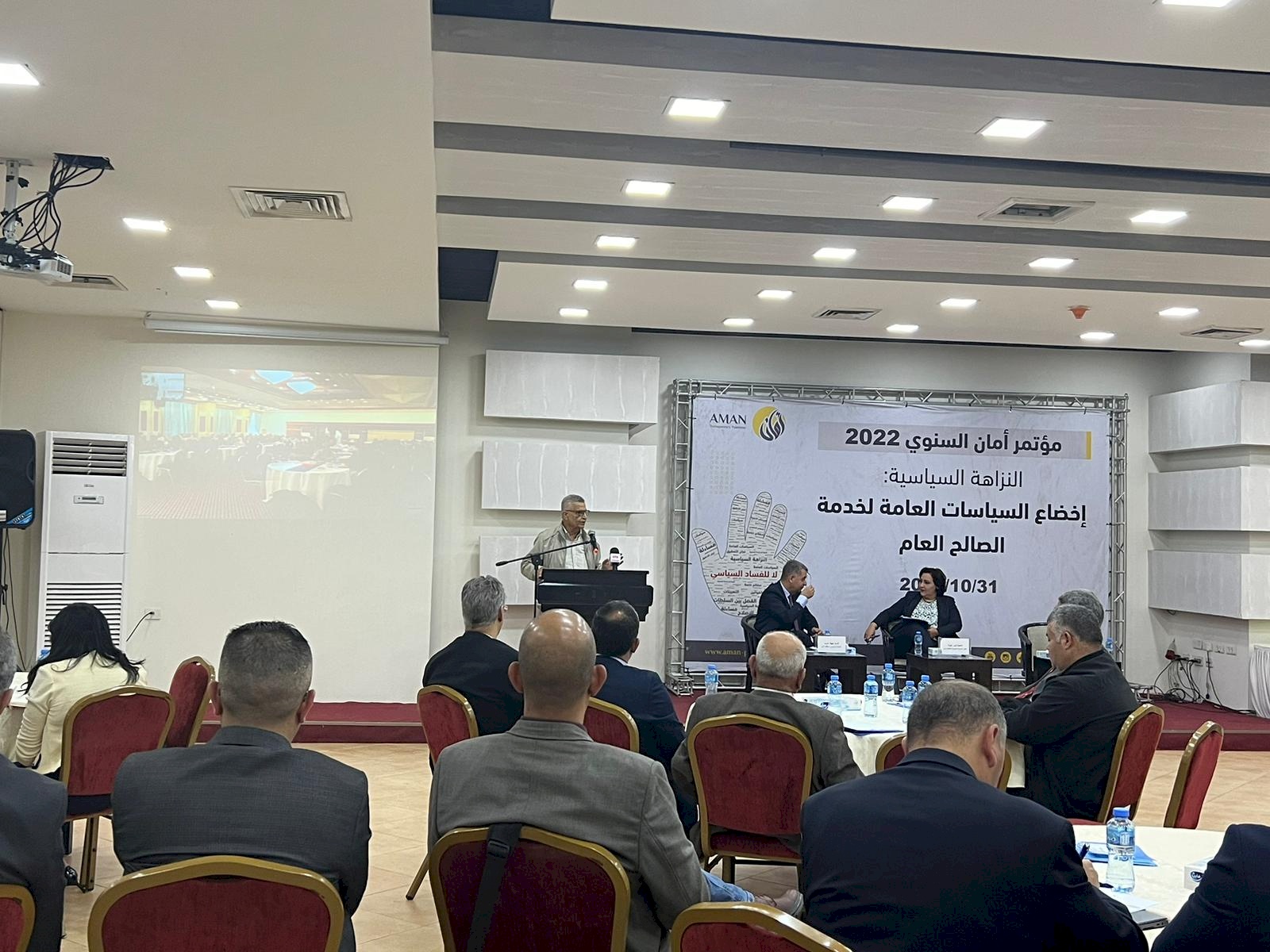
Some reform plans are submitted to donors in isolation from debates with citizens or civil society
In his presentation, Harb indicated that, albeit important, some reform plans were submitted to the donor community without making them available to the Palestinian public. For example, in May 2022, the Government Reform Agenda was presented to the Meeting of the Ad-Hoc Liaison Committee (AHLC) in Brussels. Although reform is a Palestinian public need, some reform processes have clearly been associated with international pressure, particularly by the donor community. Ahead of the presidential decision on the establishment of the National Committee for Reform in 2021, international community had put pressure on the PA to overcome government crises or in consequence of domestic complaints.
Harb explained that the Executive, namely the President’s Office and government, were in charge of making decisions and devising reform plans in different areas. Failing to engage citizens or civil society organisations, reforms are introduced without community debate to determine national priorities. Neither the public nor civil society have contributed to making national policies, including sector and cross-cutting strategies, reflecting the lack of a real will for commitment to implement these reform plans. In the absence of a PLC that exercises accountability, community accountability places pressure on the government and senior government officials.
A serious political will implies free and fair general elections
Harb provided a detailed account of the recommendations made by AMAN on the reform process. A required serious political will stands at the foundation of an elected PLC, which embraces government reform, holds the government to account, and monitors the government performance of implementation. AMAN also recommends that a national committee be established to supervise the reform process. To bring together public figures who enjoy the trust and respect of Palestinian citizens, the committee will have the necessary integrity, impartiality, independence, and experience. Reform plans will be developed in a manner which is applicable and address structural flaws in line with Palestinian national needs. These plans will not be linked to any external pressures. In addition to compliance with a transparent public budget management, implementation of the financial reform agenda needs to be monitored. To this avail, different budget documents will be made publicly accessible in a timely fashion. Community engagement in the process of priority setting will be invigorated. The government will be open to citizens by realising the public right of access to information and publishing plans, measures, processes, and decisions on the government implementation of the reform plan.
Dr. Azmi Shuaibi, Advisor to AMAN’s Board of Directors for Anti-Corruption Affairs, presented a paper on the policies initiated by parties to the internal Palestinian political divide for managing the Gaza Strip, relevant impact on the integrity of government, and political corruption. Shuaibi inquired if these policies have strengthened the integrity of government, legalised political corruption, or deepened divisions.
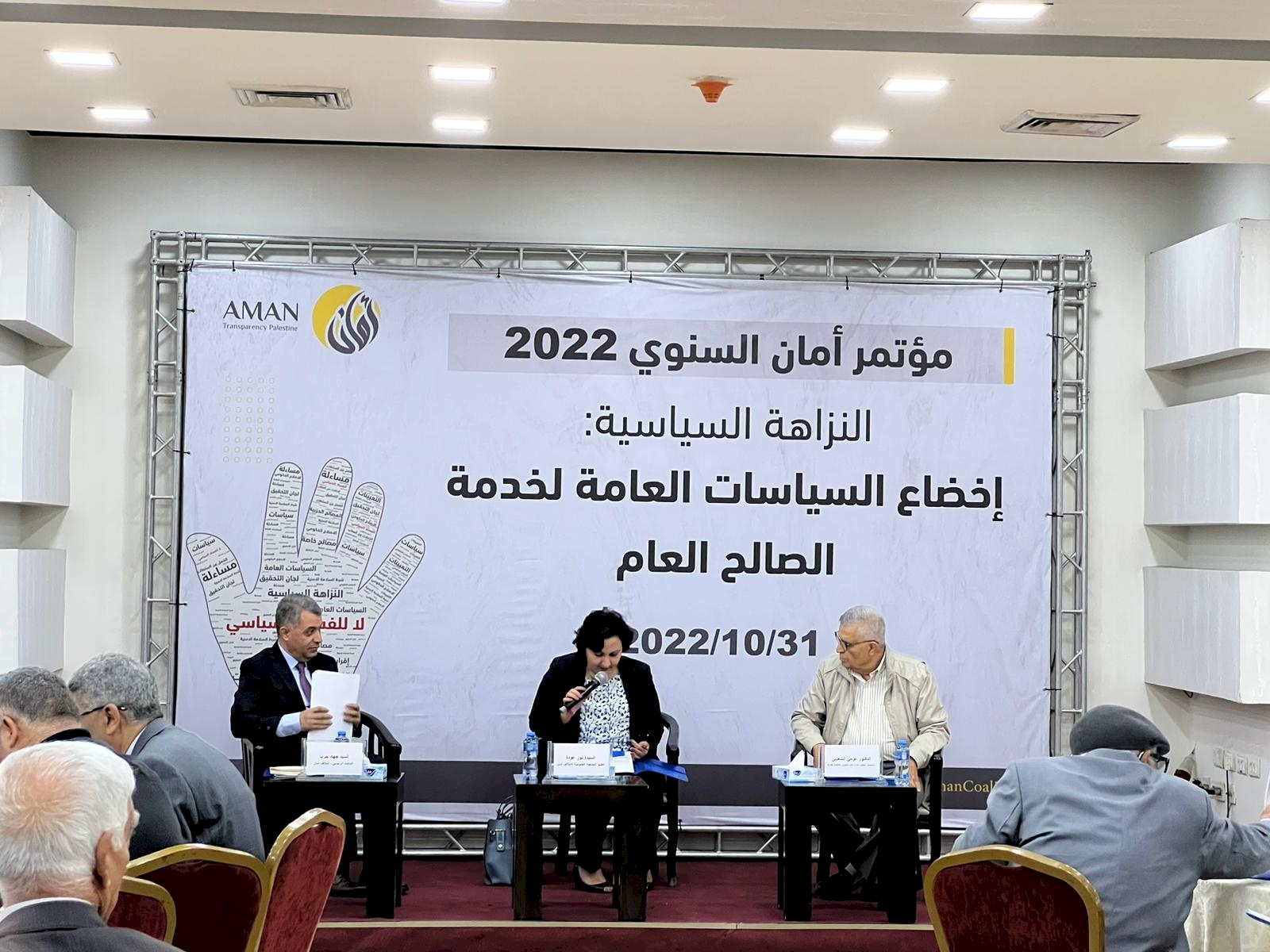
Policies of parties to the divide towards Gaza have been made along the lines of partisan interests and at the expense of the common good
Shuaibi reviewed the policies and vision embraced by the de facto (Hamas) authority for managing the Gaza Strip. Along this vein, with the growing power struggle in the aftermath of the 2006 election results, military action was taken on the ground to seize control of centres of government in Gaza in 2007. Hamas dominated leading positions and appointed persons loyal to the movement at civil institutions. In addition to creating new security agencies, the de facto government has prevented the holding of local elections. In addition, it has imposed fees and taxes on citizens to enable total control.
In his presentation, Shuaibi also presented on the West Bank-based PA policy towards the Gaza Strip. Following the Israeli withdrawal, the PA has not developed a national policy to manage Gaza. The West Bank government has adopted a public policy to tighten the grip on, incite against, and create roadblocks to the de facto authority in Gaza. For example, the West Bank government supported the public sector strike, punished collaborators with the Hamas authority, and failed to adopt an inclusive and uniform administrative policy to manage all sectors. Moreover, it has put in place a covert, but effective, financial policy, which at its core deals with the Gaza Strip as in insurgent territory.
Both in the West Bank and in the Gaza Strip, these policies have brought about the decline of integrity of government and further entrenched the internal Palestinian political split. The slogan “No State without Gaza and No State in Gaza” has resulted in the creation of a meagre, distorted, and weak semi-State in the Gaza Strip as well as a fragile authority in the West Bank. While the principle of separation of powers has been abolished, each party exercises the power of centralised government without an elected legislature or independent judicial oversight. Both parties make policies along the lines of partisan interests and at the expense of the public good. In the absence of accountability, this has allowed room for intolerance, personal gains, and personal interests of close confidantes and loyalists to centres of power.
Dr. Ghazi Hamad, Member of the Hamas Political Office, commented that Hamas had not aimed for a coup d’état against the PA. According to Hamad, on many occasions over the years, Hamas agreed to initiate the national reconciliation effort and hand over crossing points and ministries to the PA. Hamad called on civil society organisations in the Gaza Strip to monitor actions of the government, Ministry of Interior (MoI), and all detention centres. Replying to a question about Hamas’ refusal to hold local elections in Gaza, Hamad said that the movement did not have a principled objection to these elections. A democratic approach is in place. Elections have been organised at trade unions, associations, and student councils across the Gaza Strip. However, it was impossible to hold local elections “due to the extraordinary situation in the Gaza Strip.”
Security clearance reflects a persistent violation of the Basic Law and democratic values
Held simultaneously in Ramallah and Gaza, the second conference session centred on the exercise of policies that undermine the integrity of government and furnish an opportunity for political corruption. Addressing the condition of security clearance and formal commissions of inquiry, the session of Ramallah was moderated by Ms. Hama Zeidan, Operations Manager at AMAN. Zeidan indicated that although Palestinian legislation does not provide any immediately relevant definition of the term, security clearance is so extensive that it affects the holding of certain public positions. This policy has become self-evident in the aftermath of the internal Palestinian political divide. It has also negatively impacted access to or renewal of some permissions, establishment of charitable associations, access to scholarships, issuance of licences to practice an occupation or trade, etc. The security clearance phenomenon has been so pervasive that it also affects appointments to the judicial office.
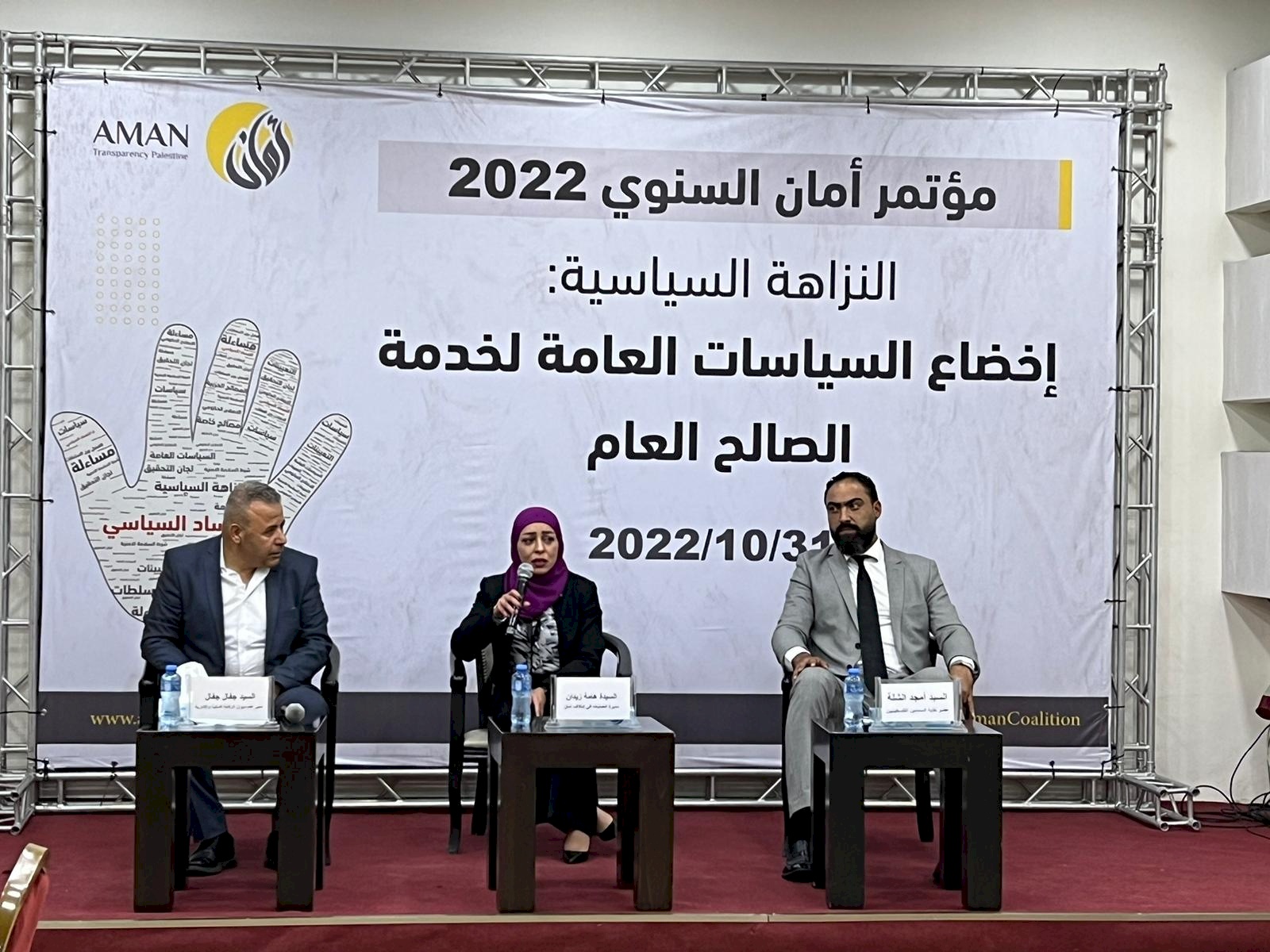
AMAN: The security clearance requirement should be abolished against the benchmarks laid out by the High Court Justice decisions of 2012 and replaced by the certificate of no-conviction issued by the Ministry of Justice
As stressed by Zeidan, the continued imposition of the security clearance condition reflects a persistent infringement on the Basic Law and democratic values. As a practice that falls under the concept of political corruption, security clearance involves abuse of the governing authority to gain political interests, rather than to maintain the common good. Zeidan cited a 2012 decision of the High Court of Justice, which provided for abolishing the security clearance condition for holding public office because it ran counter to the principles enshrined in the Basic Law.
The second conference session was corroborated by a press report prepared by Mohammed al-Atrash, a journalist. The report featured a set of testimonies given by persons, who were required to present a security clearance certificate. In his report, Al-Atrash made reference to attempts made to legitimise the so-called “security clearance condition”. For example, the Regulation on the Licensing of Media Institutions of 2022 contains the phrase “no-objection certificate issued by the MoI” (i.e. security clearance) on 14 occasions.
Al-Atrash reported on the restrictions placed on media institutions and the content they deliver with a view to ensuring consistency with the government’s official narrative. Constituting a grave violation of the freedom of expression, these constraints are part and parcel of a systematic process to silence all free voices. Supported by statements and testimonies made by different parties, the report makes clear that the security clearance (no-objection) condition impinges on many constitutional provisions of the Amended Basic Law of 2003. Most notably, it is in contrariety with the right to equality, principle of innocence, right to hold public office, right to freedom of peaceful assembly, right to political participation, and right to freedom of economic activity. Also, neither the 2005 General Intelligence Law nor the 2007 Preventive Security Law provides that either agency is tasked with approving the appointment of persons to public office or issuing licences and permissions.
Holding the government responsible for failing to eliminate the security clearance condition, AMAN recommended that this requirement be abolished in the light of the benchmarks laid out by the High Court Justice decisions of 2012. Securityc clearance should be replaced by the certificate of no-conviction issued by the Ministry of Justice (MoJ).
Different remarks
In his comment, Mr. Amjad ash-Shilleh, Member of the Palestinian Bar Association (PBA), stated that there were no public and clearly defined standards that lay out the conditions and criteria to be met by persons applying for security clearance certificates. This gap has allowed much room for using political affiliation and views as a benchmark to approve or reject the issuance of these certificates. It has led to the frequent incidence of favouritism and nepotism that affect access to needed certificates, paved the way to exploiting official influence, encroached on the legal mandate of the MoJ, and facilitated security interference with the walks of public life.
Advocate Iyad Matakh, Legal Advisor to the MoI, indicated that good conduct was grounded on the behaviour of citizens, rather than on their political affiliation. Effective in most countries around the world, this procedure is applicable to scholarships and charitable associations.
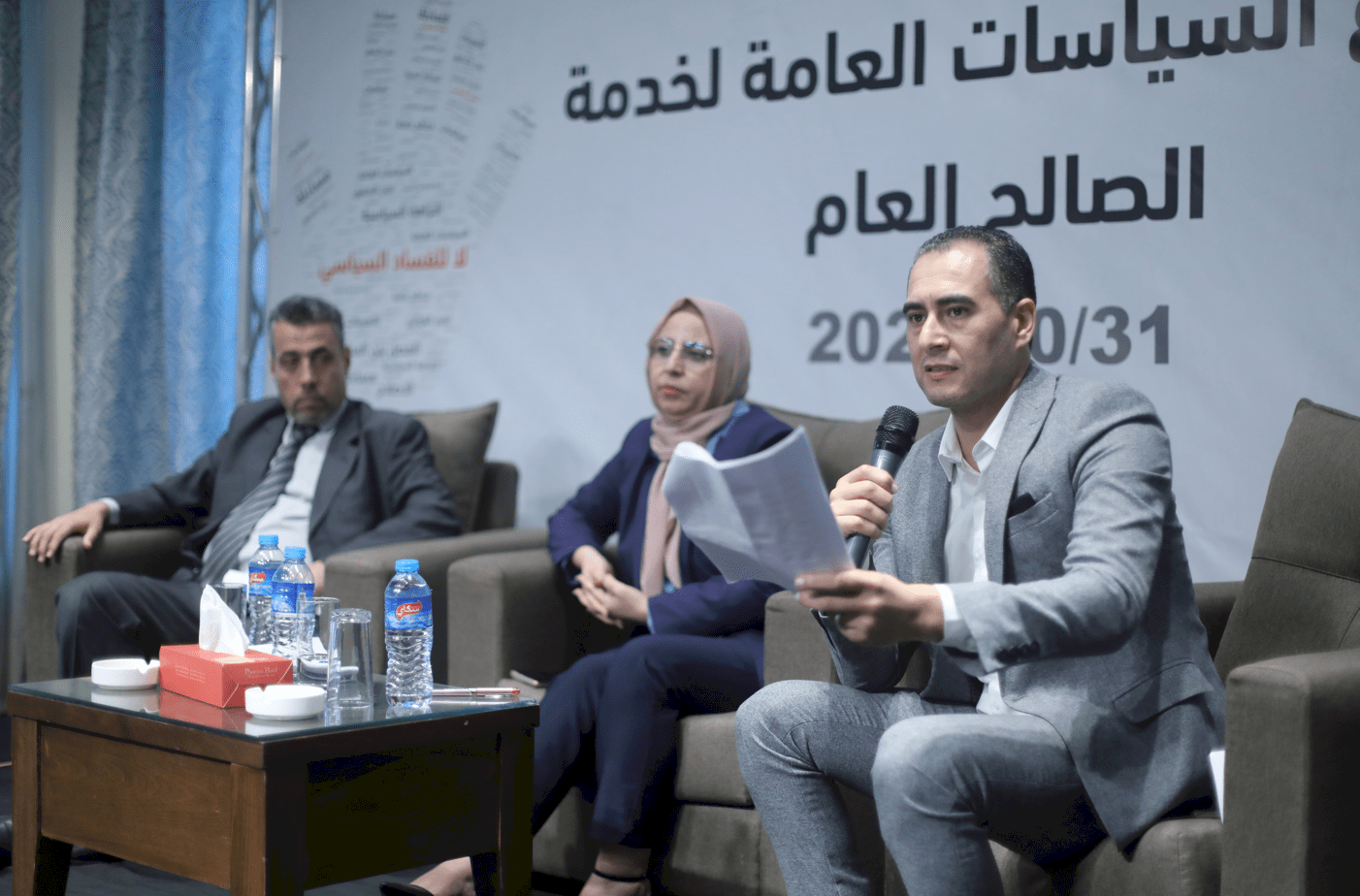
Formal commissions of inquiry … a tool to evade criminal liability and appease public outrage
The second conference session elaborated on the issue of formal commissions of inquiry and principle of no impunity. In a press report produced by the Wattan News Agency, Ms. Ansar Tumeizah, a journalist, inquired about the establishment of, and achievement of the goals set for, commissions of inquiry. Citing the experience of several commissions, Tumeizah pinpointed the committee of investigation into the murder of political activist Nizar Banat, who has become a cause célèbre. Among other instances, Tumeizah recalled the Pfizer vaccine swap deal with the Israeli side.
According to Tumeizah, the majority of commissions of inquiry did not maintain the principles of professionalism, impartiality, and integrity. No Palestinian laws regulate the operations of such commission, effectively implying a lack of institutionalisation and governance of respective functions. Additionally, it appeared that investigation committees may be used as a tool to evade criminal liability and soothe the raging public opinion in a certain matter of public interest. Many government bodies did not comply with the recommendations made by commissions of inquiry.
Need for a legislative framework to ensure the establishment of commissions of inquiry and oblige relevant bodies to implementing relevant recommendations
Against this background, AMAN recommended the need to institutionalise the functions of, and ensure integrity in the process of creating, commissions of inquiry. To make sure that officials do not enjoy impunity, membership on these commissions will avoid conflicts of interest. Standards of transparency also need to be made publicly available and maintained. A public policy will be adopted on the basis of a Palestinian legal framework, which governs the establishment, functions, and powers of commissions of inquiry. This framework will oblige relevant bodies to implement resulting recommendations in order to restore diminished Palestinian public confidence in, and learn lessons from the outcomes, of commission of inquiry.
In Gaza, the governing authority’s exclusive domination over local government appointments has undermined the independence of, and subjected municipalities and local government units, to party lines
In the Gaza conference session, presentations included a paper by Researcher Sami Ghuneim on “The impact of appointing members and heads of local government units on political integrity”. Ghuneim cast light on the Gaza-based governing authority’s monopoly on determining and selecting candidates and appointees at local government units (LGUs), compromising the independence and public representation of LGUs. Therefore, LGUs have been subjected to party directives and practice of local government. The fact that LGU formation does not engage other political parties from across the spectrum has resulted in a total monopoly of decision making on LGUs, including by removal from office, appointment, adjustment, and making of decisions that can often be questioned by others.
Ghuneim recommended that the internal Palestinian political divide be brought to an end, together with its relevant political, economic, and social consequences and drawbacks. In addition to creating an immunised environment against corruption, general (legislative and presidential) elections need to be held to allow broad public participation, restore balance of the political system, and put in place the principle of separation of powers. Local elections will also be dissociated from general elections so that the former provide a sign of hope, rather than serve as part of the problem.
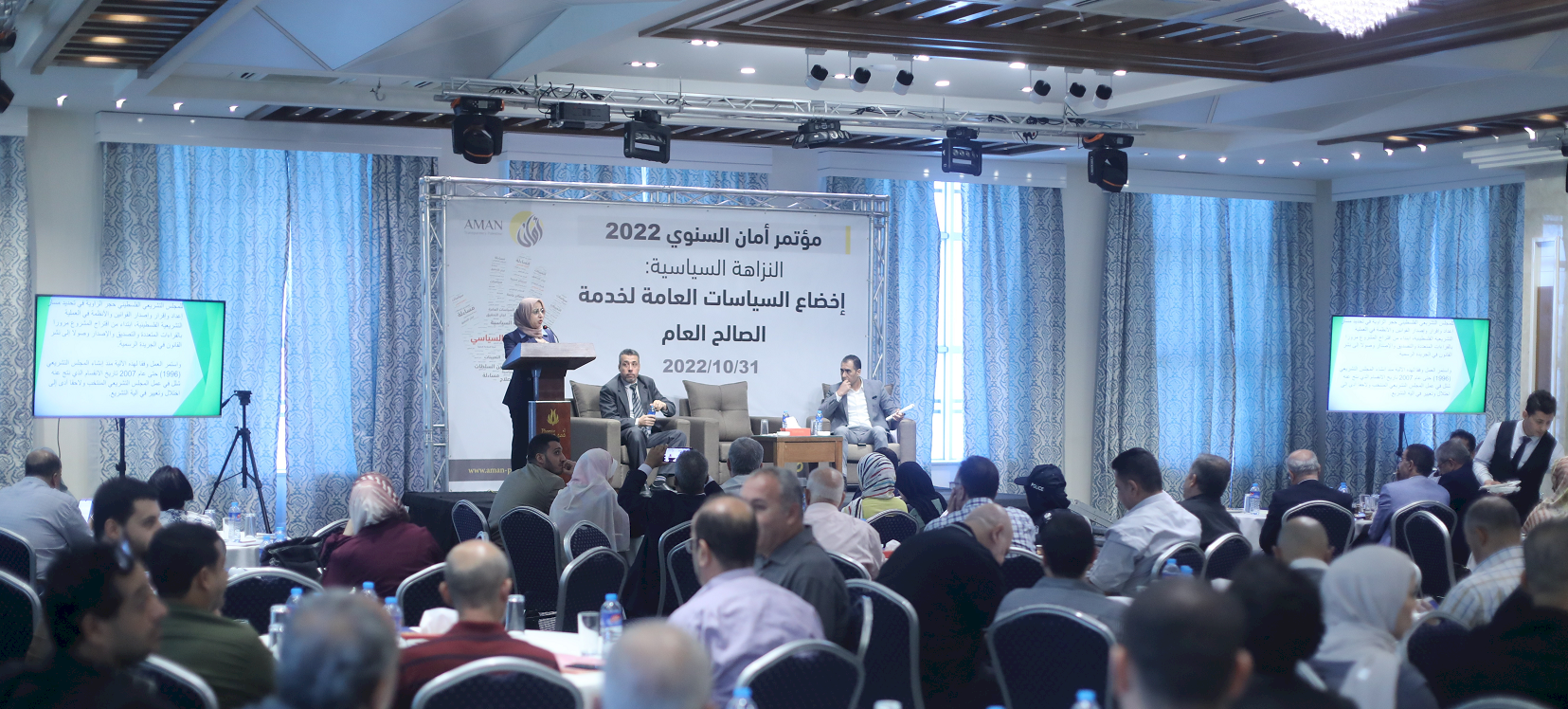
A legislative gap between the West Bank and Gaza Strip serves the interest of governing authorities in disregard of the common good
Ms. Hidaya Shamoun, Coordinator of the AMAN Monitoring and Studies Unit, presented a paper entitled “The legislative policy in the Gaza Strip and the extent to which it is subordinate to the public interest”. Highlighting a legislative gap between the West Bank and Gaza Strip, laws by decrees are promulgated and enforced in the former while at the same time laws are enacted and put into effect in latter. This has fostered legislative, judicial, and legal fragmentation and exacerbated consequences at political, economic, and social level. This division demonstrates that the law making process is in the interest of the governing regime, which turns a deaf ear to the common good.
Shamoun recommended that any regulations that may entrench the internal divide should be suspended. Institutions need to be consolidated within a single institutional framework, which creates the necessary atmosphere for bridging the legislative gap between the West Bank and Gaza Strip. To this effect, a national unity government should be formed and be in charge of ending the internal split between both areas, unify State institutions, and promote engagement in the decision making process. To do so, senior officials need to embrace the principle of openness to citizens, put in place the norms of transparency, guarantee the public right of access to information, ensure involvement in decisions on public administration, and launch a serious national dialogue with civil society organisations on necessary and urgent needs. At the same time, this initiative will focus on the scrutiny and subordination of public policies to the public interest.
Mr. Jaffal Jaffal, Director General of the State Audit and Administrative Control Bureau (SAACB), made clear that the concept of security clearance emerged in the aftermath of the internal Palestinian political divide. Security clearance is not premised on any constitutional norm. However, political and security risks that arise from certain issues, such as forfeiture of land, require that security vetting be carried out.
In his comment on commissions of inquiry, Jaffal stated that some recommendations had been referred to courts. These are not a matter for discussion now as a final judgement is still pending. The SAACB also published and made publicly accessible a report on the Pfizer vaccine swap deal.
Amjad ash-Shilleh, PBA member, explained that commissions of inquiry were legally baseless. The PLC is the only body that can provide serious monitoring of the recommendations, functions, powers, and roles of commissions of inquiry into issues with relevance to the public opinion. Ash-Shilleh indicated that a main goal of setting these commission was to appease public anger.
Holding general elections immediately and putting an end to dependency on Israeli decisions
At the conclusion of the conference, Mr. Issam Haj Hussein, AMAN Executive Director, outlined the recommendations made by AMAN. While putting an end to dependency on decisions of the Israeli occupying authorities, an initiative needs to be taken to make decisions and develop a joint national plan of action to restore equilibrium in the Palestinian political system. To this avail, the principle of separation of powers will be in force in accordance with the provisions of the Palestinian Basic Law. The law making power should be restored by the peoples’ representatives in conjunction with suspending the promulgation of laws by decrees and repealing regulations, which serve personal interests at the expense of the common good.
An honest political will to end the internal Palestinian political divide will be translated into reality. Haj Hussein also called for the immediate and complete cessation of any procedures, policies, or regulations that further complicate the process of ending the internal divide by governing authorities in the West Bank and Gaza Strip. A national unity government will be established, ensuring that relevant decisions and policies are subject to the public interest, rather than to partisan interests. Needed resources will be provided to carry out government functions and impose the rule of law. The unity government will take responsibility for consolidating State institutions, starting with those with immediately touch on citizens’ lives. A plan will be developed and implemented to unify, enhance independence, and ensure impartiality of the Judicial Authority. Reform agendas, policies, and strategies will articulate actual national needs. To this effect, a national reform committee will be established in partnership with representatives of Palestinian society groups.
